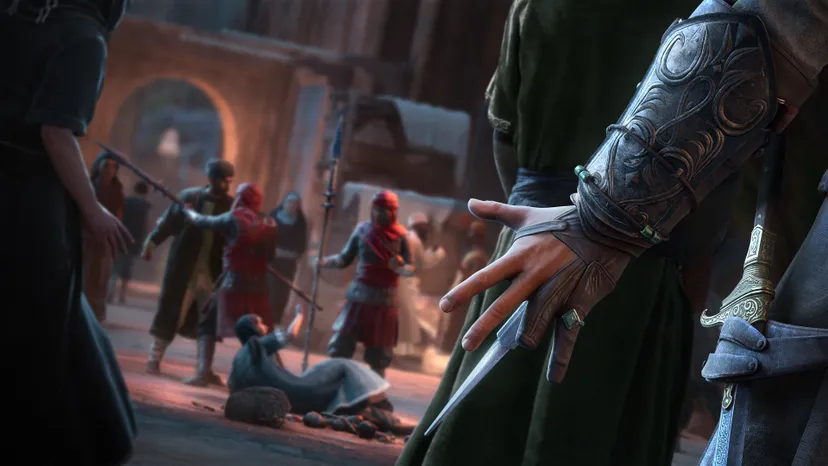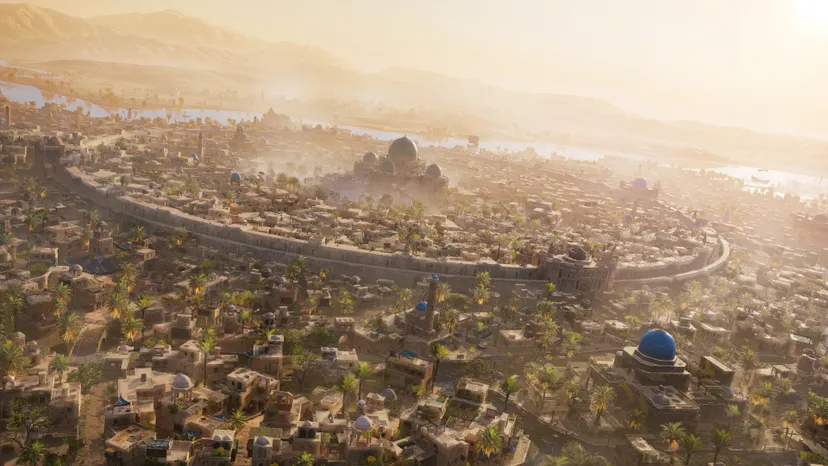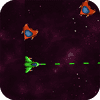Assassin’s Creed: Mirage go back to its roots with a see to Baghdad
Many seasoned fans have become interested in Assassin’s Creed: Mirage since it aims to centre the expansive historical sci-fi franchise. Since the release of the first game in 2007, the Assassin’s Creed series has expanded steadily in scope, with each new installment dwarfing the size of the one before it. The series has moved away from the social steal-action genre and into the realm of open-world action RPGs.
Designer Ubisoft Bordeaux returns the Assassin’s Creed series to its beginnings with Assassin’s Creed: Mirage, a stealth action video game set in a safe city with people to blend in with, roofs to encounter, and suspenseful minutes where you tail and strike at unwary targets. Director of narrative Sarah Beaulieu sees the video game as an homage to classic Assassin’s Creed and as a monument to the Middle Eastern lost eras, where the genre first found success, as the series returns to its formula.
Beaulieu spoke with a game developer at the current Ubisoft Forward exhibit about shaping this review for the classic Assassin’s Creed era.
Assassin’s Creed Mirage seems like the initial video game
Assassin’s Creed: Valhalla, a massive Viking-era game, is being prepared as a growth for it.That idea didn’t survive long, according to Ubisoft’s developers, who branched it off into a separate video game after recognising potential in examining a “traditional” Assassin’s Creed. Mirage reveals Basim Ibn Ishaq’s early life as a wanderer thrust into the Assassin order, setting the stage for the events of Assassin’s Creed: Valhalla. Basim Ibn Ishaq is a supporting character and the antihero of Valhalla, and Mirage serves as his origin story. He was last seen having actually made his way into the present day after centuries in hibernation.
The potential of focusing on a tighter, more focused Assassin’s Creed video game for its tales and fundamental gameplay pillars, according to the narrative director, was an appealing viewpoint for the advancement group at Ubisoft Bordeaux.
“The group was actually thrilled to be able to do an Assassin’s Creed video game like this one, both as designers and as gamers,” said Beaulieu. “We concentrated primarily on the game’s three gameplay pillars—stealth, parkour, and assassination—and chose a well-known figure like Basim for the tale. We have enjoyed every aspect of this, going back to the beginning of the series and loving that time. With this video game, that was essential for us, and it was fantastic to see it all come together.

Despite having a lesser scope than more recent titles like Origins Odyssey and Valhalla Mirage, the video game is nonetheless overseen by a large team of creators, with 12 teams around the world working on it. Baghdad in the ninth century, which is roughly the size of Paris in Assassin’s Creed: Unity, was recreated in great detail, according to Beaulieu.
In Mirage, Basim will be able to explore the city with ease, taking part in both main plot goals and side missions from the Assassin’s office, tracking down leads on Order of the Ancients members, and learning the secrets hidden throughout Baghdad’s streets. He will upgrade his tools and learn brand-new techniques as he gains expertise as an assassin to handle more audacious targets that will further entice him into a larger conspiracy.
We saw a strong demonstration of Mirage’s core loop during the Ubisoft Forward gameplay showcase, which returns players to the “evaluate, infiltrate, and carry out”-design structure created in video games like Assassin’s Creed 1, 2, and Brotherhood without the need to collect loot, level up, or complete additional missions to unlock more complex questlines.
The main idea behind Mirage, according to the designers, was “reconstructing a timeless Assassin’s Creedexperience.” It appears to be a more focused experience so far, concentrating just on the desire to be an assassin in the ancient world, and it appears to be a pretty alluring twist on a classic Assassin’s Creed video game.
Bring back Baghdad to its middle ages appeal
The Assassin’s Creed series has been particularly captivating because it has succeeded in placing intriguing action-adventure games in historical eras and places that aren’t normally found in video games. That’s what made the first video game, whose main plot centred on an Arab Muslim protagonist character in the Middle East during the Crusades in the 12th century, such an extraordinary and forward-thinking experience.
The city of Baghdad in Mirage looked incredible, bringing back the dense throng and cramped spaces from the first Assassin’s Creed video games. It was an incredible opportunity to “recreate the Middle East with brand-new innovation,” according to the designers at Ubisoft Bordeaux, since it allowed them to provide visual fidelity and amounts of detail that weren’t feasible in the original video game.
With the new technology, Baghdad and its surroundings in Mirage have a better sense of context and density, giving players more ways to immerse themselves in the setting.

Speaking to Beaulieu, it became apparent that preserving the appearance and history of ancient Bagdad was essential in order to appreciate one of history’s lost eras. This involved demonstrating the diversity of the area at the time and demonstrating how dense the city was in the ninth century.
Beaulieu emphasised that the goal was to give Baghdad’s inhabitants as well as its surroundings and look the finest care possible. Baghdad continued to be the centre of the globe in many ways as the Silk Road expanded throughout this historical era since trade routes passed through this metropolis. There were numerous people from different ethnic groups, ethnicities, and countries visiting. In this video game, we encounter a wide variety of characters, including those from China, Turkey, Iran, and, of course, Arabic. We worked with a lot of experts, both inside and internationally, to help us with this and make sure we handled things properly.
Because the ninth century in the Middle East is not well known, and because the Baghdad shown in this video game is a lost city without any designated ruins to visit or examine, she continued, “It was truly interesting. Therefore, it was vital for us to understand the environment, the people, and the cultures that existed there. It took a lot of work to put this together, and I’m happy with the group.
The leading male behind the story
By focusing on Basim’s earlier years, Mirage seeks to provide the character with a narrative tracing the beginnings of the Assassin order and his transformation into the ethically dubious antihero in Valhalla.Mirage is concerned with humanising and showing Basim’s transformation from a conceited and opportunistic guy into a significant force within the larger Assassin’s Creed timeline for the current Star Wars: Andor trilogy.
Beaulieu and the other writers on the video game found it intriguing that Basim in Mirage resembles a night and day different from his persona in Valhalla, as seen by what was shown in the gaming presentation.
According to the story director, “Basim was such a charming character in Valhallaso that it wasn’t difficult needing to craft his story because he had an excellent base to work from.”
Knowing the struggles he faced in ValhallaThe process of creating the character of Basim in Mirage, who is very different from Basim in Valhalla, was interesting.Since this is a genesis narrative with no boundaries before he became the character he is now in Valhalla, the framing for the story is ideal for me as a writer.Because he is torn between who he thinks he is or doesn’t really comprehend and the hidden ones, I learned to relate to him as a character. That is something that I think we can all relate to. We placed a lot of emphasis on giving him a human face so that all gamers could relate to him.
Basim’s tale is reminiscent of Haytham Kenway’s appearance from Assassin’s Creed III, the first video game to include a playable Templar character with a complicated background and destiny. With the knowledge that Basim would ultimately pose a serious threat to some characters, entering Mirage with an idea of where his quest will lead him gives the game’s narrative some more weight.
Mirage deviates from the series’ current focus on creating expansive experiences, but it’s fascinating to watch a modern Ubisoft analyse the series’ earlier iterations as a social stealth action game. The smaller plot and setting of Valhalla Mirage’s experience may have a larger scope, but it still punches above its weight.

























